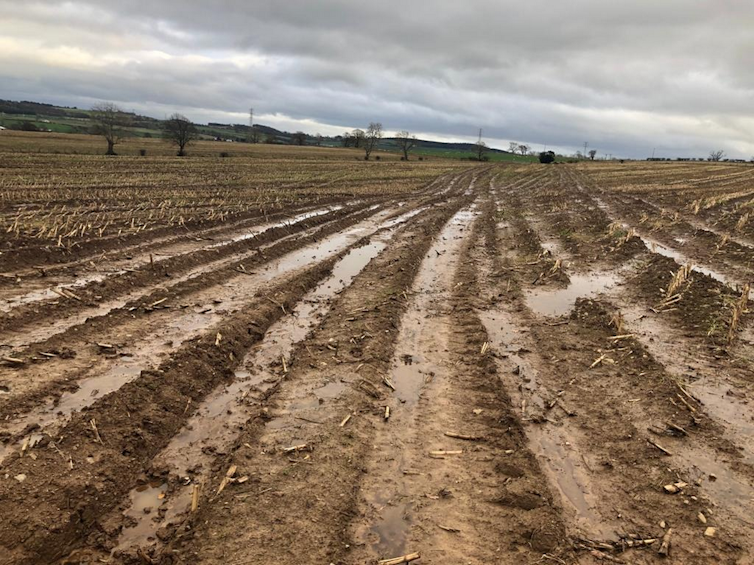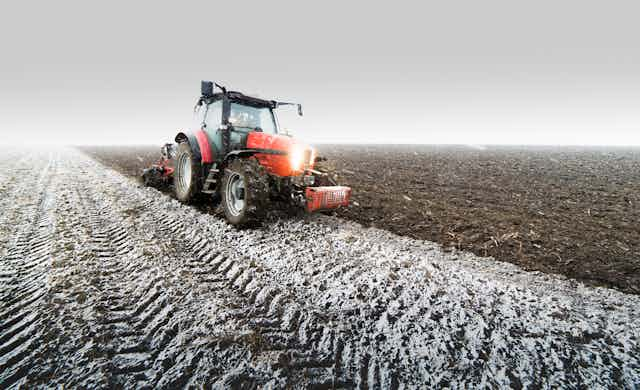Soil is one of the world’s most precious resources, but is often overlooked. The soil does many important tasks. It provides food and energy, keeps water clean, acts as a place to store carbon in the fight against climate change, and maintains biodiversity.
But some modern farming and countryside management practices have been degrading our soil, causing erosion and causing other issues in the surrounding landscape.
Now soil is at the centre of a recently announced UK government policy that will pay farmers to improve the environment by growing plants in fields through winter. It could transform how some of England’s countryside looks in the winter months and may lead to a more sustainable future for England’s agriculture.
The Sustainable Farming Incentive will replace existing payments that were part of the European Union’s Common Agricultural Policy.
Read more: Restoring soil can help address climate change
The new policy aims to establish new standards for arable and horticultural soils (grassland and moorland standards were also published). While the policy, due to be rolled out in 2022, is light on detail, the fact that these initial standards aim to promote soil health is a promising step towards providing and securing these essential ecosystem services on which society relies.
Changing countryside
The plans to encourage the planting of more winter crops will mean that visitors will see legumes such as vetch and grasses such as rye, sometimes planted together. This “cover” is designed to protect the soil from erosion caused by winter rains falling on bare soil by ensuring early establishment of a dense vegetation cover that persists through the winter months. This is a well-known erosion control strategy, protecting soil that is usually left bare and therefore threatens the production of food and pollutes water.

Winter vegetation cover can also boost soil organic matter and can help stop excess nitrates from untimely or excessive fertiliser application leaching from the soil to pollute water supplies. And increased plant diversity should improve soil health and indirectly suppress pests and disease, enhancing resilience to a changing climate.
Knowing what soils are on the farm, their condition and a plan to manage them is clearly important to ensure sustainable soil use. This will come as second nature to many farmers. Farmers will plan their cropping strategies for future seasons themselves, but how this will improve on what they will already be doing isn’t clear. It is still not known when the promised templates and guidance will be available and what it will look like.
The Sustainable Farming Incentive will provide three standard levels for soils management, each requiring more from farmers in return for higher payments. Currently only the introductory and intermediate levels have set what farmers will receive if they adopt these standards. The introductory arable and horticulture standard pays £22 per hectare and the intermediate standard £40 per hectare.
To qualify for payments for both levels, farmers will need to:
- undertake a soil assessment
- produce a soil management plan
- test soil organic matter
- add organic matter, such as manure or cover crops, to a third of the land each year
- have at least 70% of the land covered during winter months
Doing this will improve soil structure, help control erosion, and improve the soil’s capacity to absorb water. Soil contains more carbon than all the animals and vegetation and within the atmosphere combined, so looking after it is essential to sequester carbon and improve resilience to climate change.
However, there are questions about the availability, quality and quantity of organic matter that farmers might use, and whether some organic materials, such as industrial by-products, may affect soil health. More detail is expected soon.
Incentivising wider soil testing of soil nutrients will provide farmers with better knowledge on managing fertilisers and manures, reducing nutrient losses to the environment that cause water pollution and damage to ecosystems.
Establishing winter crops to cover the fields may be tricky in some parts of England, such as Cumbria, where the autumn climate does not always favour plant growth. Some plant breeders are producing varieties suited to improving soil health and producing a dense cover in cold and wet climatic conditions.
Clearly these environmental grants for farmers recognise the central role that soil plays in supporting crop production and helping meet the UN sustainable development goals. As always the devil will be in the detail, but these new standards represent a major step in the right direction for the nation’s soils, and the environment.

